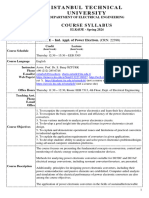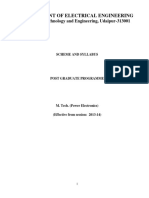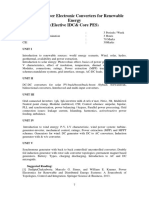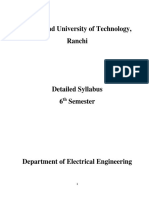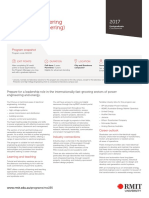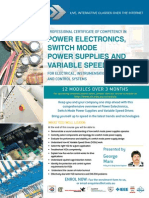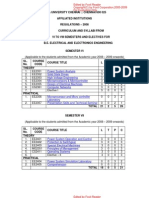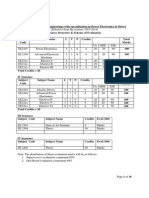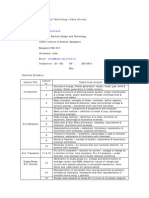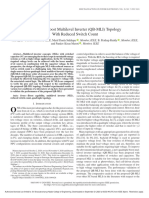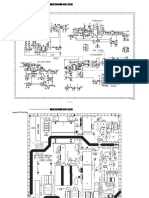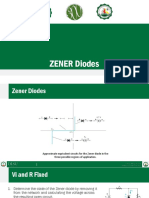University of Manchester Course description
Electrical Energy Conversion Systems are integrated networks of power electronic converters, electrical machines, actuators, energy storage devices, and control systems. As a result of recent advances in power electronics technology, these systems are becoming commonplace and can be found in more-electric aircraft and ships, electric vehicles, railway systems, renewable power generation, active management of power distribution systems, automation systems for factories and industrial processes. The adoption of electrical energy conversion systems is being driven by the need to increase energy efficiency, and controllability, whilst reducing system weight and maintenance costs.
This MSc course has been designed to equip electrical engineers with the knowledge and skills that are required to design modern electrical energy conversion systems, it includes the fundamentals of electrical machine and power electronics design, system integration, control, energy management and protection. The teaching team of eight academic staff belong to the Power Conversion Group and are all actively involved in researching new aspects of machines, drives, power electronics and electrical systems, particularly for applications in transport and sustainable electricity supply. The Group's research activities and industrial links inform the course content and enrich the student experience.
Aims
To develop your ability to integrate strands of power electronics, drives, vehicle systems and small power utilities with the control of these systems To enhance your experience through learning in a research-rich area and through contact with leading researchers in the application of electrical energy conversion technology To encourage you to evaluate critically drive and supply technology applied in manufacturing and transport industries To enable you to gain experience in analysis and design of systems employing recent developments in the research areas and to prepare students who wish to continue on to research studies
The MSc course begins with an introduction to the building blocks of converters, machines, actuators and relevant control systems. The course will give you a high level of exposure to system integration and is illustrated by a broad range of high-technology activities related to industrial and other systems. In addition to lectures, tutorials, design exercises and enquiry-based learning, you will attend industrial seminars and practical laboratories which employ mainly industrial equipment. The course will include a `mechatronic' emphasis in examining how system blocks interact and ensuring that electrical and mechanical systems work together.
�The summer is spent on an individual dissertation project, which is strongly supported by the Power Conversion Research Group's research base (including the Rolls-Royce University Technology Centre) and extensive industrial contacts. Cutting-edge research areas include versatile power and conversion systems for a variety of applications, including more-electric aircraft and ships, electric and hybrid vehicles, automation systems and autonomous/microgrid power systems.
Coursework and assessment
The course is designed for students to build up a solid foundation in the relevant technologies and integrate these in systems. Eight taught course modules (four in each semester) are offered between September and April, followed by an individual research project from May onwards. Each module contains lectures, supervised enquiry-based directed learning and independent study. The practical laboratories employ mainly industrial equipment, providing the student with hands-on experience, and the course also includes lectures from industry. After the final examinations in May, students concentrate on their project work. Projects with industrial involvement will be offered, where possible.
Course unit details
The course of study begins with essential material on power electronics, machines and analysis methods. The course then progresses to look at the combination of electrical machines and power electronics to form electrical drives, including the associated control systems. These topics are subsequently developed as sub-systems in the overall area of energy conversion and their integration into efficient and effective systems concludes the taught element. Case studies on modern energy conversion systems are used throughout to reinforce the theoretical work, for example electric vehicle power trains, aircraft actuation systems, electric ship propulsion systems, aircraft generation and distribution systems, and microgrids. The individual research project allows you to develop research skills and explore a key area in greater depth.
Course Aims
To offer knowledge and expertise to meet an urgent need for specialists in advanced electrical energy systems which are required to address the challenges introduced by global energy considerations and the integration of renewable generation in electricity transmission and distribution networks.
Special Features
Research-led programme based on partnerships with industry and involving industrially-linked projects with major electricity companies. Unique laboratory facility in Europe including a hardware power system simulator for training and projects. Opportunities for PhD research following successful completion of MSc, and excellent job opportunities with leading electrical energy companies. University partner on both IET Power Academy and Power Networks Research Academy.
�Course Description
The core modules are delivered by research academics in the School of Engineering, with guest lectures from experienced engineers and managers from the electricity industry. A key feature of the programme is its integrated approach to teaching Power Systems, High Voltage Plant Technology and the enabling technologies which provides essential preparation for a career in future electricity networks. Optional modules are taught by colleagues from other research groups in the School in order to achieve a multi-disciplinary input to the scheme. The demand for graduates from this type of course is very strong and is expected to remain so for the foreseeable future. Graduates are expected to gain employment in large electrical energy utilities, electricity distribution companies, the public sector (energy agencies, Carbon Trust etc), research and development, or set up their own companies. Topics covered on the course include:
Power Systems Analysis Distributed Generation Smartgrids and Active Network Devices, Power System Protection, Condition Monitoring, Systems Modelling and Forecasting, High Voltage Technology, Alternative Energy Systems, Sustainable Energy Studies, Advanced Power Electronics, Introduction to Digital Signal Processing, Industrial Computer Control Systems, Management in Industry, Energy Management.
�Power Electronics and Applications:
Objectives On completion of this module students should be able to:1. demonstrate awareness of modern power semiconductor switching devices, their characteristics and fields of use, and to explain their switching and thermal behaviour; 2. understand switch-mode power supplies with transformer isolation; 3. understand power electronic control principles for renewable energy sources; 4. comprehend 3-phase variable frequency bridge inverters and output control; 5. extend the understanding of the behaviour of a practical 3-phase induction motor drive under a combination of variable-frequency and variable-voltage operation; 6. understand the basics of induction motor dynamics; 7. explain the structures, operations and principles of control of electronically commutated brushless PM and variable reluctance drives. Syllabus 1. FET, IGBT and MOSFET switches: operational characteristics, limitations, fields of use, switching behaviour and losses, basic thermal behaviour in terms of steady-state and transient resistance. 2. Switched-mode power supplies with transformer isolation: structure, operation, role of energy storage, influence of leakage and magnetising inductances. 3. Power electronic control of photo-voltaic source stand-alone/grid-connected.
�4. Three-phase variable frequency inverters: six-step bridge inverter, PWM controlled inverter. 5. Variable speed 3-phase induction motor drives: operation with variable-frequency and variablevoltage, operation with variable frequency and constant voltage. 6.Basics of induction motor drive dynamics. 7. Brushless permanent magnet motor and variable reluctance motor drives: structure, operation and principles of control.
Advanced Energy Systems/Alternative Energy Systems/Sustainable Energy Systems
Objectives To provide further analysis of industrial power generation from conventional, renewable and nuclear sources. Syllabus - Advanced power generation. - Coal combustion. - Fluid bed combustion and power generation cycles. - Gasification and combined cycles. - Factors influencing cycle efficiency. - Hydrogen production. - Co-firing. - Recent developments in gas turbine combustion and power cycles. - Current limits on performance. - Zero emission power generation.
�- Solar power generation. - Design considerations. - Nuclear power generation. - Neutron diffusion and moderation. -Nuclear reactor theory. - Reactor dynamics. - Reactor safety.






